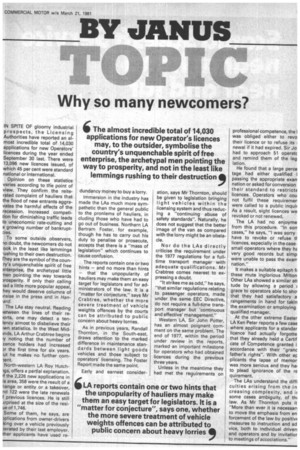Why so many newcomers?
Page 69

If you've noticed an error in this article please click here to report it so we can fix it.
6 The almost incredible total of 14,030 applications for new Operator's licences may, to the outsider, symbolise the country's unquenchable spirit of free enterprise, the archetypal men pointing the way to prosperity, and not in the least like lemmings rushing to their destruction s
IN SPITE OF gloomy industrial prospects, the Licensing Authorities have reported an almost incredible total of 14,030 applications for new Operators' licences during the year ended September 30 last. There were 13,096 new licences issued, of which 45 per cent were standard national or international.
Opinion on these statistics varies according to the point of view. They confirm the reiterated complaint of hauliers that the flood of new entrants aggravates the harmful effects of the recession, Increased competition for diminishing traffic leads to uneconomic rate-cutting and a growing number of bankrupt
To some outside observers, io doubt, the newcomers do not oak in the least like lemmings Pushing to their own destruction. rhey are the symbol of the counry's unquenchable spirit of free mterprise, the archetypal little nen pointing the way towards )rosperity. If only their calling lad a little more popular appeal, hey would deserve columns of praise in the press and in Hanard.
The LAs stay neutral. Reading )etween the lines of their rearts, one may detect a tenlency almost to disbelieve their iwn statistics. In the West MidKids, LA Arthur Crabtree begins ,y noting that the number of cence holders had increased D r the first time for six years. ut he makes no further corn-rent.
North-western LA Roy Hutchigs, offers a partial explanation. If the 2,226 new applications in is area, 358 were the result of a -iange or entity or a takeover, nd 122 were the late renewals I previous licences. He is still irprised at the size of the resiJe of 1,746.
Some of them, he says, are )plications from owner-drivers king over a vehicle previously De ra ted by their last employer. ther applicants have used re
dundancy money to buy a lorry.
Immersion in the industry has made the LAs much more sympathetic than the general public to the pronlems of hauliers, in cluding those who have had to go out of business. Northern LA Bertram Foster, for example, though he has to carry out his duty to penalise or prosecute, accepts that there is a "mass of legislation" which continues to cause confusion.
The reports contain one or two hints — and no more than hints — that the unpopularity of hauliers may make them an easy target for legislators and for administrators of the law. It is a "matter for conjecture," says Mr Crabtree, whether the more severe treatment of vehicle weights offences by the courts can be attributed to public concern about heavy lorries.
As in previous years, Randall Thornton, in the South-east, draws attention to the marked difference in maintenance standards between light goods vehicles and those subject to operators' licensing. The Foster Report made the same point.
Early and earnest consider
ation, says Mr Thornton, should be given to legislation bringing light vehicles within the licensing system and thus reducing a "continuing abuse of safety standards". Naturally, he does not suggest that the better image of the van as compared with the lorry might be an obstacle.
Nor do the LAs directly criticise the requirement under the 1977 regulations for a fulltime transport manager with adequate qualifications. Mr Crabtree comes nearest to expressing a doubt.
"It strikes me as odd," he says, "that similar regulations relating to passenger operators, made under the same EEC Directive, do not require a full-time transport manager but 'continuous and effective' management."
Western LA, Sir John Potter, has an almost poignant comment on the same problem. The end of 1977, within the period under review in the reports, marked an important milestone for operators who had obtained licences during the previous three years.
Unless in the meantime they had met the requirements on professional competence, the I was obliged either to revo their licence or to refuse its newal if it had expired. Sir Jo had to approach 51 operatc and remind them of the leg lation.
He found that a large perce tage had either qualified I passing the appropriate exarr nation or asked for conversion their standard to restrictc licences. Operators who cou not fulfil these requiremer were called to a public inquir As a result, eight licences we revoked or not renewed.
The LA had no enjoyme from this procedure. "In son cases," he says, "I was sorry have to revoke or refuse tt licences, especially in the case small operators where they hz very good records but simp were unable to pass the exannation."
It makes a suitable epitaph ft these mute inglorious Milton Other LAs showed a similar att tude by allowing a period grace to operators able to sho, that they had satisfactory a rangements in hand for takin the examination or employing qualified manager.
At the other extreme Easter LA Ken Peter reports a few case where applicants for a standar licence had actually forgotte that they already held a Certif cate of Competence granted i accordance with their "granc father's rights". With other ar plicants the lapse of memor was more serious and they ha, to plead ignorance of the re quirement.
The LAs understand the diffi culties arising from the in creasing complexity, and ii some cases ambiguity, of thi law. As Mr Thornton puts it "More than ever it is necessar to move the emphasis from en forcement of the law by positivi measures to instruction and ad vice, both to individual driver and operators and by invitatio, to meetings of accociations."












































































































